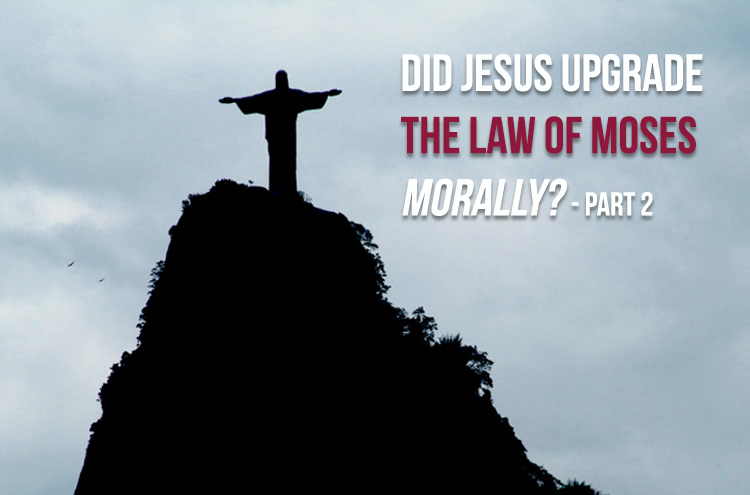Did Jesus upgrade the Law of Moses morally? This is the same question we asked in our previous little lesson, and we’re going to elaborate a little bit more on it in this lesson. If you didn’t watch the first part, you might want to back up and watch that part first.

We talked last time about the fact that the second greatest commandment (see Mark 12:28-34) is a standard that is an Old Covenant and a New Covenant standard. It’s brought forth by Paul and James in their epistles as the highest standard to live by. They fully endorsed that loving your neighbor as yourself is the standard which we all ought to be living by. James said whoever does that does well (James 2:8)
Did Jesus Morally Upgrade the Law of Moses in the Sermon on the Mount?
So we’re wondering, where do people get the idea that Jesus upgraded the Law of Moses? That generally comes from their interpretation of the Sermon on the Mount where Jesus about six times said, “You have heard it was said,” and then He says, “but I say to you.” We would expect that if Jesus was upgrading the Law of Moses in those cases that, first of all, He would correctly cite the Law of Moses. He does on a couple of occasions, but out of the six times most times He doesn’t correctly cite it.
For example, He said, “You have heard it said love your neighbor and hate your enemy” (Matthew 5:43). Well, where is that? In fact, if you have a Bible that puts Old Testament references in all upper case, you’ll see that the first part of that statement is in upper case, where Jesus said, “You have heard it was said love your neighbor.” That’s in all caps. “And you shall hate your enemy,” that’s not in all caps because that’s not to be found in the Old Testament. That’s not in the Law of Moses. God never said to hate your enemy.
So Jesus is not correctly citing the Mosaic Law when He says that, and there are other cases as well.
What God Commanded All Along
Also, you’d expect not only that Jesus would correctly cite the Old Covenant standard, but that His upgrade would actually be an upgrade. That in fact the new standard He gives, you wouldn’t be able to find it under the Law of Moses, because it’s a new upgraded standard. But yet you can. In every case you can.
Jesus said,
You have heard that it was said, ‘You shall love your neighbor and hate your enemy.’ But I say to you, love your enemies and pray for those who persecute you. – Matthew 5:33-34
If Jesus was upgrading the Law of Moses, you would think, well, obviously then that upgrade can’t be found in the Old Covenant. That’s a new standard that’s never been heard before. But au contraire monsieur, that is an Old Covenant standard!
Should we love our enemies under the Old Covenant? Well, apparently God thought so, because in Exodus 23:4 God says, in the Law of Moses, “If you meet your enemy’s ox or his donkey wandering away, you shall surely return it to him.”
Well, that doesn’t sound like hating your enemies! That sounds like loving your enemies. An Old Testament, Old Covenant, Mosaic Law standard. Not brand new under the New Covenant.
And then God elaborates in Exodus 23:5,
If you see the donkey of one who hates you [that’s your enemy] lying helpless under its load, you shall refrain from leaving it to him, you shall surely release it with him.
Help your enemy. There’s his donkey lying there. It can’t get up under its load. You’re not to ignore that. You’re to go over there and help release that load from that donkey with your enemy. Help him. Serve him. Go the extra mile. Turn the other cheek. Ah! An Old Covenant standard.
Turning the Other Cheek in the Old Covenant
Here’s one for you. Leviticus 19:17-18:
You shall not hate your fellow countryman in your heart; you may surely reprove your neighbor, but shall not incur sin because of him. You shall not take vengeance, nor bear any grudge against the sons of your people, but you shall love your neighbor as yourself; I am the Lord.
How about that? So much for the idea that loving your neighbor, or even loving your enemy, is just a New Covenant standard.
An Old Testament Standard that Paul Quoted
Well, here’s one more. This is in the Old Testament. It’s not in the Law of Moses but it’s certainly contained within the body of literature from the Old testament and worthy of quoting in the New Testament as binding upon Christians.
Are you ready for this one? Proverbs Chapter 25:21:
If your enemy is hungry, give him food to eat; And if he is thirsty, give him water to drink.
Who’s that? Your enemy. Your enemy! That sounds like even more than turning the other cheek. Oh my goodness, your enemy is hungry and thirsty, and you’re feeding him or her and giving him or her something to drink. And why? God says in Proverbs 25:22:
For you will heap burning coals on his head, and the Lord will reward you.
It’s interesting that the Apostle Paul quotes these verses from Proverbs as being binding upon New Covenant Christians.
Romans 12:19-20:
Never take your own revenge, beloved, but leave room for the wrath of God, for it is written, “Vengeance is Mine, I will repay,” says the Lord. “But if your enemy is hungry, feed him, and if he is thirsty, give him a drink; for in so doing you will heap burning coals on his head.”
So you can see that the Apostle Paul believed that the Old Covenant standard was still the New Covenant ethic. You can find the New Covenant ethic in the Old Covenant, in the Law of Moses.
Jesus Did Not Introduce a Higher Standard
So can you see this now? People say things like “Jesus gave a brand new standard in the Sermon on the Mount, something that no one had ever heard before and it’s a higher standard.” “The whole Old Testament is irrelevant! We don’t even have to look at the Mosaic Law because we have a higher standard now.” That’s erroneous teaching.
On our next Little Lesson, I’m going to drive this point home even further as we look at a couple more of the “You have heard, but I say to you” statements by the Lord Jesus Christ in the Sermon on the Mount. Okay? Thanks for joining me. Thanks for being so humble to receive this teaching! God bless you.

